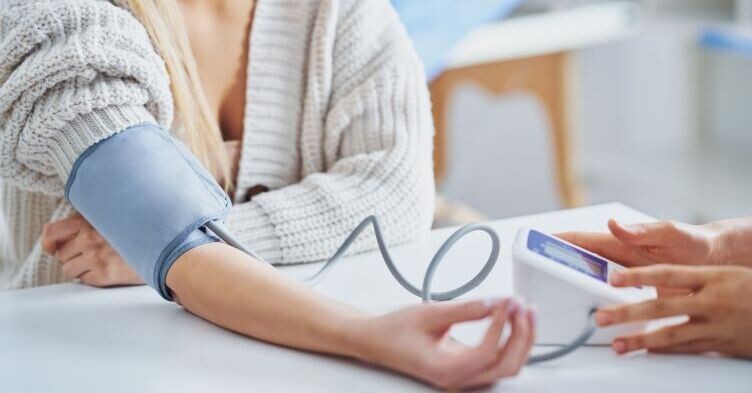Supporting hypertension self-care: a nurse’s perspective

In our series showcasing highlights from Nursing in Practice 365 live events, nurse specialist in cardiovascular medicine Michaela Nuttall advises on the crucial role nurses play in supporting patients with hypertension to understand and manage their condition
For community nurses, there is no escaping hypertension; with about one in three adults in the UK having high blood pressure, they will encounter patients every day with the condition. In England, 31% of men and 26% of women have high blood pressure.1
Despite improvements in diagnosis and management, hypertension remains a major risk factor in stroke, myocardial infarction, heart failure, chronic kidney disease, cognitive decline and premature death.1 One study found only two in five people with diagnosed and treated hypertension had good control of their blood pressure.2 While there are a number of underlying reasons, supporting patients to have better self-care in controlling their blood pressure is key to addressing this issue.
If untreated, hypertension can cause vascular and renal damage. Each 2-mmHg rise in systolic blood pressure is associated with a 7% increased risk of death from heart disease and a 10% increased risk of death from stroke.3
Tailoring patient education
Nurses play a vital role in educating patients about their condition and this is critical to the success for prevention, identification, diagnosis and management of hypertension, with the aims of improving:
- Awareness.
- Knowledge.
- Management.
- Outcomes.
Many of the education materials available are ‘one size fits all’, but more recently targeted advice has been developed for people whose ethnicity puts them at great risk of hypertension.4
For patients with diagnosed hypertension, there is a NICE guidance for hypertension patient decision aid,5 which is a great step forward and includes options to answer the question ‘What can I do to try to lower my blood pressure and lessen my chances of a stroke or a heart attack?’ which nurses can use with their patients to explore three options:
Related Article: Diagnosis Connect service will link people to advice from charities
- Do nothing.
- Make lifestyle changes before trying medicines.
- Take medicines to lower blood pressure as well as trying lifestyle changes.
The decision aid outlines what each option involves, as well as its advantages and disadvantages. This helps you go through each option with the patient in a clear and methodical way, so you can discuss the implications and take steps towards the appropriate goal.
However, this is a 10-page document, and while extremely useful, a certain level of health literacy is assumed.
Checking patients’ understanding of hypertension
Health literacy is what determines how well people are able to make informed health decisions.
It is defined as ‘the personal characteristics and social resources needed for individuals and communities to access, understand, appraise, and use information and services to make decisions about health’.6
It is both an individual and a systems issue: it involves an individual’s ability to understand and use information to make informed decisions about their health and care; and it also reflects the complexity of health information and the health care system.
Affecting change in the system does not happen quickly. However, many nurses see patients every working day and have multiple opportunities to consider the patient’s individual aspect on health literacy – ie, what they understand about their care. This means it’s not just what we say; it’s how we say it.
So, how can health literacy impact hypertension? Many people with hypertension need two or three different types of medication to control their blood pressure, and they are often prescribed other medications for comorbid conditions such as diabetes or heart disease. Take a moment to pause and consider whether patients really understand how many tablets to take.
One study of 395 English-speaking people explored: 1) how accurately patients read the instructions of five container labels; and 2) how accurately they demonstrated what each label’s dosage instructions meant.7
The percentage of patients able to correctly state what the five labels said ranged from 71% to 89% across different levels of literacy (reading, writing, speaking and listening ability). However, when asked to ‘Show me how many pills you would take [of this medicine] in one day’, where the label read ‘Take two tablets by mouth twice daily,’ only 35% of people with low literacy correctly demonstrated four tablets (table 1). The researchers also noticed that taking a greater number of prescription medications was statistically significantly associated with misunderstanding the dosage instructions.
Table 1 Stating and demonstrating medication by literacy
| Stated correctly | Literacy | Demonstrated correctly |
| 71% | Low literacy | 35% |
| 84% | Marginal literacy | 63% |
| 89% | Adequate literacy | 80% |
Promoting the benefits of lifestyle changes effectively
Related Article: CVD prevention must be national health priority, says report
Lifestyle is essential in managing hypertension. Smoking, excessive alcohol consumption, excess dietary salt, unhealthy diet, obesity and lack of physical activity are all modifiable risk factors associated with high blood pressure. Many people are surprised to learn that modifying those risk factors can sometimes be more effective than medication (table 2).8,9
Table 2 Impact of lifestyle modifications on blood pressure
| Modification | Recommendation | Potential systolic BP reduction |
| Reduce weight | Maintain normal body weight
(BMI of 18.5-24.9 kg/m2) |
3-20 mmHg |
| Adopt DASH diet | Rich in fruit, vegetables and low-fat dairy; reduced saturated and total fat content | 8-14 mmHg |
| Reduce dietary sodium | <100 mmol (2.4g)/day | 2-8 mmHg |
| Increase physical activity | Aerobic activity >30 min/day most days of the week | 4-9 mmHg |
| Reduce alcohol consumption | Men: < 2 drinks/day
Women: < 1 drink/day |
2-4 mm Hg |
Again, remember, health literacy is not just about what we say; it’s how we say it. Using behavioural change techniques such as motivational interviewing can increase the chances of success. Motivational interviewing is a goal-oriented style of communication with particular attention to the language of change, designed to strengthen personal motivation for and commitment to a specific goal. 10
Even if we are well informed about hypertension care, this doesn’t necessarily mean we are good at helping people to manage it.
Often, there is an expectation that it is all about the medication, and while it is an important part of a treatment pathway, medication only works when taken correctly and the power of lifestyle should never be underestimated.
Related Article: Prescribing in England to be led by a single national formulary
Michaela Nuttall is a nurse specialist in cardiovascular medicine
References
- Public Health England. Health matters: combating high blood pressure. 2017
- Tapela N, Collister J, Clifton L et al. Prevalence and determinants of hypertension control among almost 100,000 treated adults in the UK. BMJ Open Heart 2021;8:e001461
- NICE. Hypertension in adults: diagnosis and management. [NG136] 2019
- Blood pressure UK. Your ethnic background and your blood pressure.
- NICE. Patient decision aid. How do I control my blood pressure? Lifestyle options and choice of medicines. 2019
- NHS England. Health literacy. Enabling people to make informed health decisions.
- Davis T, Wolf M, Bass P et al. Literacy and misunderstanding prescription drug labels. Ann Intern Med 2006; 145: 887-94
- Chobanian A, Bakris G, Black H et al. The Seventh Report of the Joint National Committee on Prevention, Detection, Evaluation, and Treatment of High Blood Pressure. JAMA 2003; 289: 2560-71
- Blumenthal J, Sherwood A, Gullette E et al. Exercise and weight loss reduce blood pressure in men and women with mild hypertension. Arch Intern Med 2000; 160: 1947-58
- NHS England. eLearning for Healthcare. Motivational interviewing video. 2019

See how our symptom tool can help you make better sense of patient presentations
Click here to search a symptom




